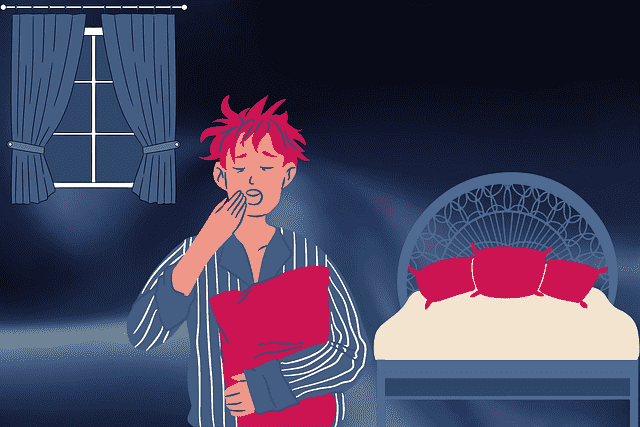What is insomnia?
Insomnia, which means difficulty getting or staying asleep, is a symptom, not a diagnosis or disease. It can be caused by a lack of sleep or poor quality sleep.
Insomnia affects people in different ways. People suffering from it may not be able to fall asleep or stay asleep. You may constantly wake up earlier than others in the early hours of the morning, and find that you cannot get back to sleep. (Source)
Symptoms:
The most common symptoms of insomnia are:
- Frustration and preoccupation with lack of sleep
- Physical pain such as headaches and stomachaches
- Reduced performance at work and daytime sleepiness or lack of energy
- Difficulty paying attention or ADHD
- Anxiety, tension, and irritability
- Depression and mood swings

Facts:
- Insomnia is one of the most common sleep problems. About one in three adults has bouts of insomnia that last for several days at a time. This is acute insomnia. But one in ten adults suffers from persistent sleep problems, known as chronic insomnia. This is defined as insomnia that occurs more than three nights a week for more than one month.
- Women are more likely to suffer from insomnia than men.
- It is also more common among shift workers who do not have consistent sleep patterns or people with low incomes or people who have a history of depression and those who do not have much physical activity.
Causes:
Insomnia has many possible causes. They may include some or all of the following:
- Medications that disrupt sleep
- Dietary choices like caffeine late in the day disrupt sleep
- Stressful thoughts
- Depression or death of a loved one
- Hormonal changes such as those that accompany menopause
- Sleep Disorders
- Chronic pain or medical conditions such as acid reflux, thyroid problems, stroke, or asthma.
- Substances such as alcohol and nicotine
- Travel, especially between time zones.

Treatment:
The doctor will consider any medical conditions, medications you are taking, and stressful life changes that could be causing insomnia.
Your sleep history matters. Be prepared to describe your insomnia in detail, such as how long it lasts, what you think might be contributing to it, and what your sleep pattern is like, such as if you barely manage to fall asleep or if you also wake up. soon.
In some cases, a physical exam will be conducted. The doctor will look for any physical reasons that could be causing the sleep problems.
Treatment methods like medicines to help fall asleep and stay asleep, change in existing medications, or counseling to help get rid of stress and other problems may be prescribed.
Precautions:
- Diagnose your sleeping pattern and make necessary changes in your lifestyle to improve it.
- Write down the questions you want to ask your doctor before your visit. At your visit, write down the names of new medications, treatments, or tests and any new instructions your provider gives you.
- Practice yoga and light exercises for at least 15-20 minutes a day.
- Try taking a warm water bath to cool your mind and tension 2 hours before sleeping.
- For better sleep, avoid using any digital device 2-3 hours before bedtime. Keep gadgets away to have a peaceful sleep at night.
Home Remedies:
1. Lavender oil
Lavender oil is a type of essential oil obtained from the lavender plant. People have used it for thousands of years as a natural remedy to improve sleep and induce feelings of calm.
Lavender is usually safe for humans as a dietary supplement, but it can sometimes interact with other medications. Anyone already taking sleeping pills or high blood pressure medications should consult their doctor before taking lavender oil supplements. Look for supplements with around 80 mg of lavender oil for safe and effective dosage.
2. Valerian root
People can take valerian in tea, tincture, capsule, or tablet form. Talk to a qualified herbalist before preparing and taking valerian, but a typical dose would be 400-900 mg shortly before bedtime.
3. Chamomile
People can drink chamomile as tea, or they can use it as an essential oil or as a dietary supplement.

4. Mindful meditation
The positive effects of mindfulness on well-being are well documented and include reducing stress, increasing resilience, improving mood, and even boosting immunity. However, mindfulness can also have an improved effect on sleep.
Also Read: Everything You Wanted To Know About Vitamin C Aka Ascorbic Acid





